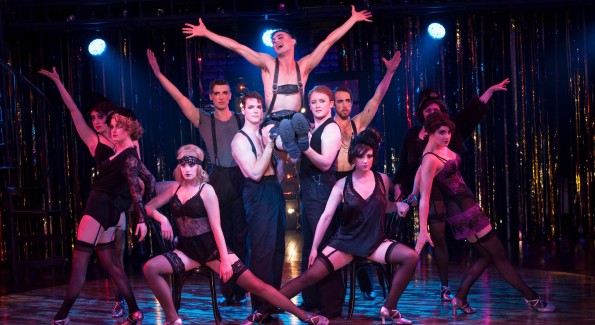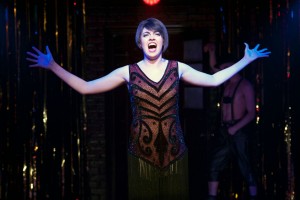‘Cabaret’ simultaneously tells the tale of the Kit Kat Klub dancers and the fall of Nazi-era Berlin.

Wesley Taylor (Emcee) and the Kit Kat Boys and Girls in ‘Cabaret’ at Signature Theatre. (Photo by Margot Schulman)
When Liza Minnelli portrayed Sally Bowles in the 1972 movie version of “Cabaret,” her characterization of the tragic, but compelling singer at the Berlin Kit Kat Klub was so inspired that it was said that she ruined that role for any future actress. Minnelli did own that role, but over the years other actors in “Cabaret” revivals have succeeded in being the quirky, flawed Sally.
A deserved addition to that list is Barrett Wilbert Weed, whose portrayal of Sally Bowles in the Signature Theatre production of “Cabaret” is establishing a new standard that will be hard to top. The willowy Weed has star presence. She has a compelling Broadway voice and smartly projects a sympathetic understanding of the complicated misfit, Sally. She controls the cynical, flirtatious song at the club, “Don’t Tell Mama,” to the beautiful love ballad of loneliness, “Maybe This Time.”
The frequently revived John Kander and Fred Ebbs “Cabaret” is a dark look at the final days before the Nazis movement was rising to power. The musical has one of the great scores of the last half of the 20th century and when it opened on Broadway in 1966, it went on to receive 11 Tony Award nominations, and won eight of them, including Best Musical and Best Score.
Developed from a book by Christopher Isherwood, “Cabaret” focuses on the night club singer, Sally Bowles, who was patterned after a woman Isherwood knew in Berlin during the waning days of the Weimer Republic. Sally is a young, adrift, not especially talented singer in the tawdry Kit Kat Klub where the girls are available and so are the boys.
The uncomfortable decadence of that period is personified in the Kit Kat Klub Emcee, portrayed with a demonic fervor by Wesley Taylor. The Emcee represents the most loathsome elements of the period, but he would have been more effective if “Cabaret” director and choreographer Matthew Gardiner had toned down Tayler’s excessive mugging a tad.
“Cabaret” does symbolize the years of studied indifference to the rise of a seemingly minor political movement that would soon unleash havoc and death on a global scale. The focus is on Sally and a would-be novelist, and American, Cliff Bradshaw. Gregory Wooddell is an effective Bradshaw, of ambiguous sexuality, who falls in love with Sally after she comes to stay with him in his room after being thrown out by another man.
There is also an elderly German couple: an aging Fraulein and a Jewish fruit vendor. An end to the Germany they thought they knew and understand is coming, but there is a studied reluctance to see it. It is a painful truth of the time that the fruit vendor, Herr Schultz, portrayed by the always compelling actor Rick Foucheux, expresses. He is warned the Nazi movement will be dangerous for him, but dismisses the warning because he understands Germans because he is a German. This comes after his marriage plans to Fraulein Schneider collapse, because she begins to see the inherent danger of marrying a Jew. Naomi Jacobson as Fraulein Schneider, sings “What Would You Do?” of her fear and why she can’t marry Schultz, in a plaintive, melodic voice.
Two other special performances come from the ever effective Bobby Smith as the Nazi Ernst and Maria Rizzo as the energetic, lovely Fraulein Kost, who makes her living bringing sailors into her bedroom. They are the ones who emphasize the terrible turning point when they begin singing the chilling anthem, “Tomorrow Belongs to Me.”
Misha Kachman’s set is a recreation of the Kit Kat Klub. A sizable portion of the theater is set up with an array of night club tables where part of the audience sits as though they are actually in the Berlin dive. There are phones on each table and the bar is selling drinks. There is an effective simplicity about the set with metallic, reflective streamers around the room and a runway that cuts through the audience.
The Kit Kat girls’ dance numbers work on the small stage. They are supposed to be dancers of limited abilities, and there are other reasons they work at the dive night spot. Frank Labovitz has dressed the Emcee and the waiters in short lederhosen and keeps them enticingly bare chested. The other costumes are reflective of the styles and Nazi uniforms of the period.
There is an unending fascination with Nazi Germany in an attempt to understand how such a virulent regime was able to unleash such death and destruction. “Cabaret,” with its focus on Sally Bowles, had its genesis in Isherwood’s short novel, “Goodbye to Berlin,” a perfect title for the message that “Cabaret” delivers.
‘Cabaret’ continues through June 28 at Signature Theatre, 4200 Campbell Ave. Arlington, Virginia 22206. Tickets are $86-$120 and available at 703-820-9771 or online here.

